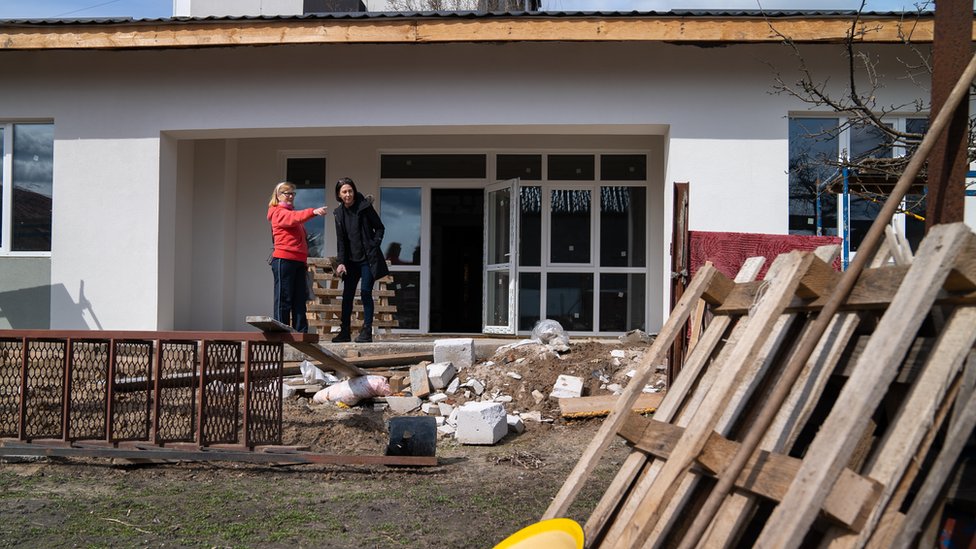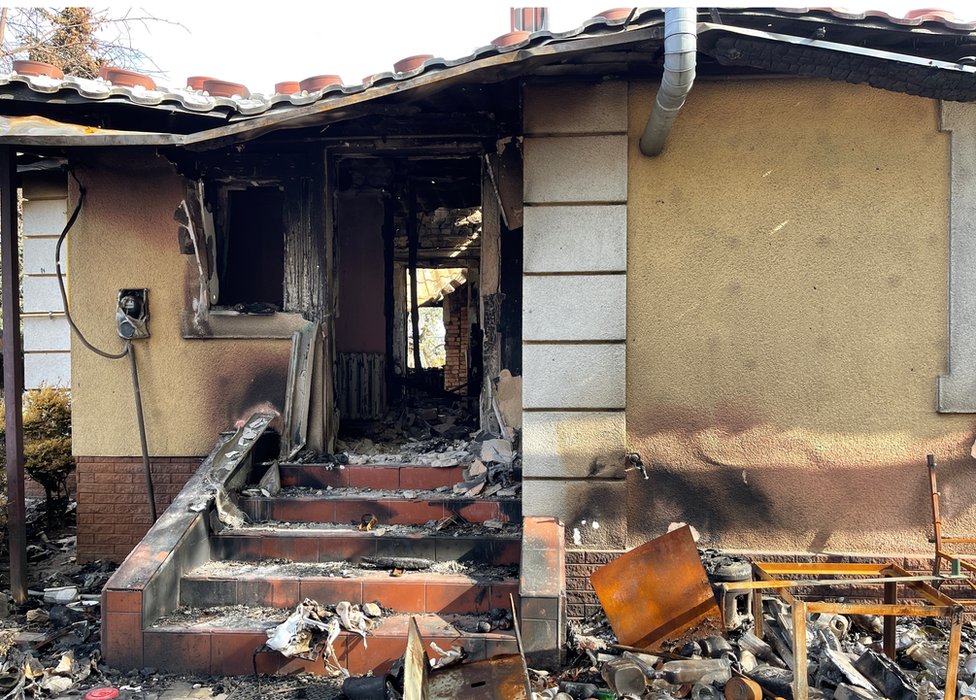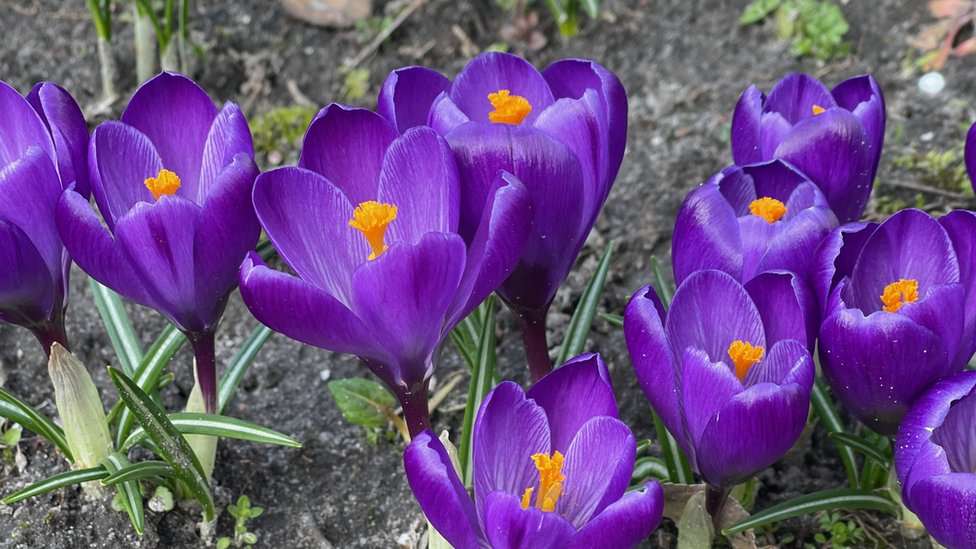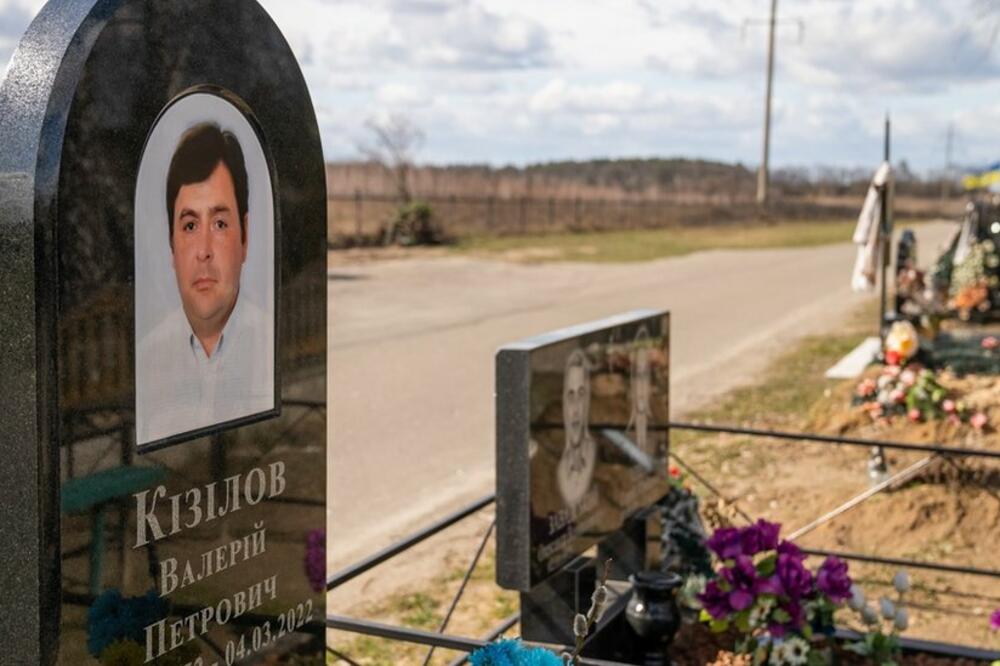In March 2022, Russian forces captured the Ukrainian town of Buch, near Kiev, leaving behind a trail of death and destruction that shocked the world.
Two years after they left, the BBC's Eastern Europe correspondent Sarah Rainsford returned to see how its traumatized residents were trying to return to normal life.
- Mass murders of civilians in Buca - what is known a
- Crimes in Buča: "I regret that they didn't kill me too"
- "Where are we going to get all those bodies": Life with the people who collect the dead in Buca
When the Russian soldiers killed Lyudmila's husband, she had to wrap him in a blanket and bury him in the back of her own garden.
Then she ran away from Buca with her daughter.
It was in March 2022 and the Russians occupied this small town near Kiev and took over the nursing home.
Soldiers entered their yard with a tank and used the house across the street as a headquarters.
Two years later, Lyudmila finally erected a marble tombstone on Valery's grave with his photograph.
After the Russian forces withdrew from Bucha, she managed to rebury him properly in the local cemetery.
Their home, destroyed in the fighting, is slowly being rebuilt and Ljudmila has started planting brightly colored flowers in the yard.
But when the house is finished, she will live there alone.

The construction is an integral part of the effort to reconstruct Buča from the ruins left by the Russian soldiers after the retreat.
When Ukrainian forces retook the city, they discovered bodies all over Jablunska Street where people had been killed.
It was the first time that the outside world learned about the horrors Buča suffered during the 33 days of occupation.
"We have a moral obligation to support the families living in that street because more than 70 civilians were brutally killed and tortured there," explains the town's mayor, Anatoly Fedoruk.
Jablunska Street and the area around it were cleaned, beautified and in some places rebuilt.
But the Russians have taken over "almost every yard or house," according to the mayor, who estimates the total cost of reconstruction at 1.6 billion euros.
"Of course we don't have that amount. But we are doing everything we can to get people back to their homes."
- "Can you make a pink prosthesis with little flowers" - stories of survivors from Buča
- "Russian soldiers raped me and killed my husband"
- "I saw Russian soldiers kill my father"
Just a few steps from Jablunska Street, Ljudmila's new home is still just an empty shell.
The builders promised to finish it by the summer, but she didn't see them for days.
Without a roof over her head for two years, with her great personal loss, Ludmila can't wait to move in.
"I'm trying to cope with everything, but my blood pressure is high, which it never was before the war," she says, leading me around the construction site.
“I'm getting heart scans, signs of trouble. It's all from stress. From memories."
In 2022, I saw the burned ruins of Lyudmila's old home shortly after the Russians retreated.
There was still a pile of alcohol bottles and wrappers from their military food dishes in the yard.
It was a bunch of people who shot Ludmila's husband in the head when he broke his nose for a moment from the basement where the two of them were hiding.
She found Valerie's body later that night, lying face down on their porch.
The investigation into his death is still open, one of hundreds of potential cases of war crimes in Buca.
Ludmila was recently called by the police who found new footage from security cameras and hoped that she would be able to identify the soldiers in the footage.
Watch the video:
"Perhaps they can be charged in absentia. I know that Russia will never extradite them," says Lyudmila, realistic about the chances of anyone being held accountable for the murder.
"Personally, I'd like to grab them by the throat and demand they tell me why they came here," she says, suddenly perking up.
"They are nothing."
Behind the white walls of St. Andrew's Church, where many were buried in a mass grave during the occupation, there is now a memorial wall with metal commemorative plaques.
For now, there are 509 names on them.
Some tiles are still empty because there are more than 100 unidentified bodies in the city cemetery, dug up from shallow graves all over Buca and reburied.
First, their DNA samples were taken, in the hope that one day someone would come looking for them.

Other memorial plaques on the commemorative wall do not have a date of death, only the month of March while Buča was still under Russian occupation.
Across the road is a sign listing dozens of names of people who are still missing.
Among those names is Bogdan Kostarenko, whose wife Natalija and I met for the first time. in 2022.
I investigated the murder of five men from Buča whose bodies were found under a children's summer camp.
Natalia's husband was taken away by Russian soldiers and she feared he might be one of the dead.
But he wasn't.
"They took him to Belarus, then to Detention Center number two in Bryansk, Russia," says Natalija, sharing the latest news with me - after months of searching, she finally found Bogdan in prison in Russia.
Through other Ukrainians exchanged for Russian prisoners of war, she learned that he was in an institution in Tula, south of Moscow.
"Russia has officially confirmed that he is their prisoner, but I had to find him through my own contacts," she tells me.
"They should just bring back the civilians, but they don't."
Bogdan retired from the army in 2019 with post-traumatic stress disorder.
As a civilian prisoner, Natalija fears that his chances of a prisoner exchange are slim, as only very few non-combatants have been returned so far.
"There are many civilians from Buca who are still missing - people we know are in prison, but the Russians haven't confirmed that."
"At least they officially admitted that they are holding Bogdan."
Natalija has not heard directly from her husband since he was taken away.
But she knows from others who were held in Brijansk that they were tortured.
"They say it was very difficult - they weren't fed, they were beaten brutally, with electric shocks and pipes," she tells me.
"Now I don't know what else to do. I can't free him. I can't find a way to do that."
- How psychologists help Ukrainian children to cope with war trauma
- Gruesome evidence points to war crimes committed on the way to Kiev
- Can Putin be prosecuted for war crimes in Ukraine?
Natalija herself is originally from Russia.
Both of her parents are from the country that is now holding her husband illegally and is accused of abusing him.
People like Natalya were used by Vladimir Putin as an excuse to invade Ukraine.
He claimed that he had to save them from the brutal treatment of the "Nazi" government in Kiev.
While we are talking in the yard, children are playing football, laughing and shouting.
Most of the pre-war population of Buča has returned, among them many who fled to Ukraine as refugees.
But Natalia worries that things could go wrong again.
"You see what Putin is up to, blaming Ukraine for the Moscow terrorist attack," she tells me.
"I think he wants total war. Total mobilization."

On the other side of the city, Ludmila is also worried, especially with the recent frequency of Russian missile attacks.
She continues to visit her house to see how it is progressing and to be closer to the memories of the pre-occupation period.
She feeds Murka, a stray cat that Valery used to like to photograph, and there's gardening to distract her when things get too hard.
"What ruins are all over Ukraine! They are building again here in Buca and it is a great joy. But there is no peace, no stability."
Ludmila shows me the purple crocuses and hyacinths in neat rows and the green shoots of the white flowers.
Then she leads me past the porch where Valery was killed, through the wooden gate, to the plot of land where she had to bury him.
"Just look at how many tulips have sprouted!", Ludmila points towards that place, which is now just a well-kept bed again.
"It used to be so beautiful here. Soon we will have flowers again, all around the house."
Moscow immediately rejected allegations of war crimes by its soldiers, claiming that "it was all staged."
Sergei Lavrov, the Minister of Foreign Affairs of Russia, has on several occasions said that Moscow is demanding an independent investigation into what happened in Buca.
"We asked for an investigation, because such a crime cannot go uninvestigated. No one answered us," Lavrov said in an interview with Russian state media in December 2023.
He repeated the same this year, saying that he asked UN Secretary General Antonio Guterres to form an independent investigative team and to identify the people whose bodies were displayed in Buca.
"Nothing followed," Lavrov said.
Follow us on Facebook, Twitter, Instagram, YouTube i Viber. If you have a topic proposal for us, contact us at bbcnasrpskom@bbc.co.uk
Bonus video:




